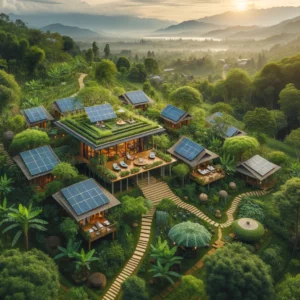Introduction
In the heart of Northern Thailand, amidst its lush landscapes and tranquil settings, lie natural spas that offer a unique blend of relaxation and wellness. These serene havens harness the healing properties of hot springs, traditional Thai massage, and holistic wellness practices, set against the backdrop of the region’s stunning natural beauty. From the mineral-rich waters of hot springs to the therapeutic touch of skilled masseurs, Northern Thailand’s natural spas invite visitors to embark on a journey of rejuvenation and serenity.
The Healing Waters: Natural Hot Springs
Among the treasures of Northern Thailand are its natural hot springs, celebrated for their health benefits and serene beauty. The San Kamphaeng Hot Springs in Chiang Mai stand out as a prime example, offering visitors the chance to relax in natural mineral pools surrounded by traditional Thai pavilions and lush greenery. The mineral-rich waters, known for their soothing properties, provide a tranquil escape that embodies the healing spirit of the region’s natural spas.

Traditional Thai Massage: An Ancient Art of Healing
Traditional Thai massage, an integral component of Thailand’s wellness heritage, offers a unique healing experience that combines stretching, pressure points, and rhythmic compression. This ancient art, rooted in Buddhist practice, is more than just a form of relaxation; it’s a holistic approach to healing the body and mind. In Northern Thailand, outdoor spa settings nestled in lush tropical gardens provide the perfect backdrop for this therapeutic practice, allowing visitors to immerse themselves in the tranquility of nature while experiencing the rejuvenating effects of Thai massage.

Wellness Retreats Amidst Nature
Northern Thailand is home to numerous wellness retreats that offer a sanctuary for those seeking to harmonize their body, mind, and spirit. These retreats utilize the natural beauty of the region to enhance the wellness experience, offering programs that include yoga, meditation, herbal treatments, and detoxification. Surrounded by the serene landscapes of Northern Thailand, these retreats provide an idyllic environment for personal growth and relaxation, emphasizing the connection between natural surroundings and holistic well-being.
Eco-Friendly Practices and Sustainable Tourism
Northern Thailand’s natural spas are not only sanctuaries of wellness but also pioneers in sustainable and eco-friendly practices. Emphasizing sustainability and conservation, many retreats integrate solar panels, organic gardens, and natural building materials into their design. This commitment to eco-conscious living ensures the well-being of both guests and the environment, offering holistic health programs in settings that blend seamlessly with the surrounding nature.

The Impact of Ethical Tourism on Elephant Welfare
Ethical tourism practices play a crucial role in enhancing the welfare of elephants in Northern Thailand. By supporting sanctuaries that prioritize the health and happiness of elephants, visitors contribute to the phasing out of exploitative practices and the promotion of conservation efforts. These sanctuaries not only provide a safe haven for rescued elephants but also educate the public on the importance of conservation and respectful wildlife interactions.
Conclusion
Exploring the unique natural spas of Northern Thailand offers more than just relaxation and wellness benefits; it’s an opportunity to engage with and support eco-friendly and sustainable practices. These wellness retreats exemplify how health and well-being can be pursued in harmony with nature, fostering a deep connection to the environment and promoting the conservation of the region’s natural beauty. As we seek rejuvenation in Northern Thailand’s tranquil settings, let us also embrace the principles of sustainability and ethical tourism that protect these treasures for future generations.